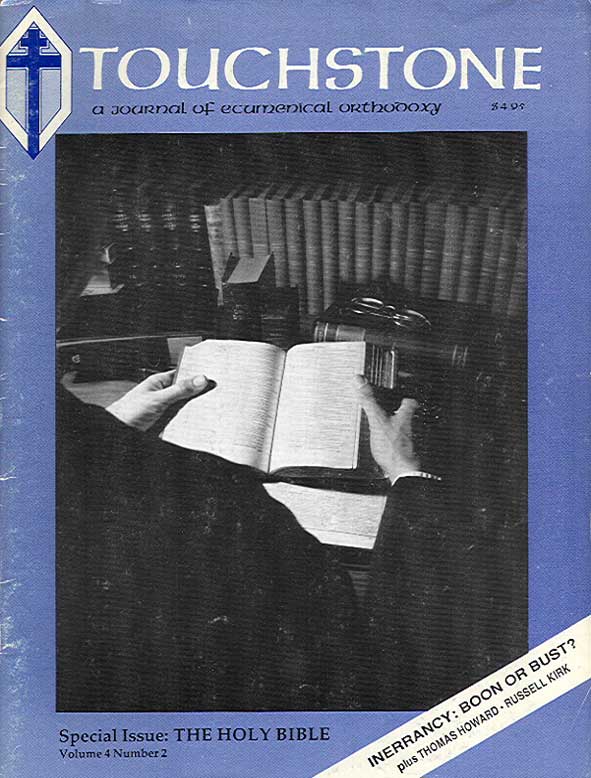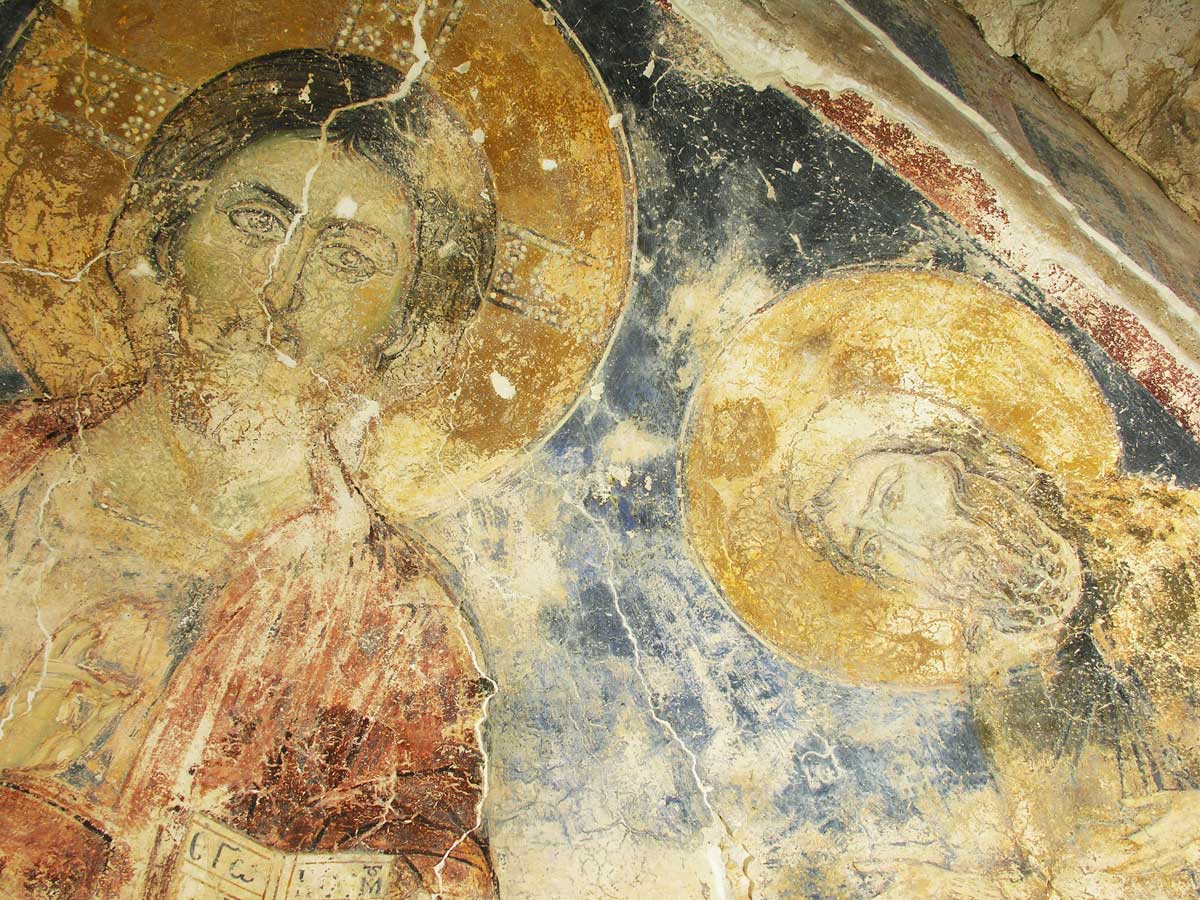Recovering the Spiritual Sense of the Scriptures
An Interview with Fr. Paul Quay, S.J.
Fr. Quay, you have been studying the place and role of the spiritual sense of the Scriptures, and you have just finished writing a book on this subject. It is something which in the past has loomed large in the Church’s tradition. What is your particular concern with this subject?
I believe that the problem raised by Marcion back in the second century is still very much with us, namely the dropping of the Old Testament: Why do we need the Old Testament, if the New Testament is the complete fulfillment of the Old? Even if one admits that there is a spiritual sense in the Old, in which Moses is a type of Christ, Abraham a type of the Christian believer, and so forth, why do we need it? If you know what all these things are prefiguring, why do you need the prefigurement anymore, except for apologetic uses? If for the Christian the Old Testament’s sole purpose is to point to Christ and if the Gospels and Epistles give us Christ, why bother? The attitude often seems to be that we could use the Old Testament as good literature, but why not drop the lists of the Edomite kings and all that stuff? Maybe we could make for ourselves a nice little book with some outstanding poetry and gorgeous prophetic passages—squeeze 1,000 pages into maybe fifty or sixty.
I think that for Catholics since Vatican II the problem is that there is an enormous emphasis on a sentimentalized, and now psychologized, attitude developed from the view that the New Testament is an adequate statement of all that Christ came to teach us. This fails completely to recognize that our Lord in actual history was speaking to his contemporaries, a people well-prepared. Therefore, he didn’t have to go over the same points again. He taught the first semester through his word in the Old Testament; the Gospel was the second semester. He didn’t have to go back and reteach the first semester.
So, for example, one of the things which the gay rights movement has been pushing is that you have no direct condemnation by Jesus of homosexual activity—at least nothing recorded in the Gospels. Then they make excuses for what is in the Epistles. But the point they ignore is that Jesus didn’t have to speak to this issue. Every Jew knew that homosexual activity was simply outside the range of the Law on any interpretation possible. The same thing goes for many other things. So, I think that Christians today need the Old Testament to get the first semester.
Beyond that, we have lost the spiritual sense of the Scriptures, which has always been something vital to the core doctrine of the Church. Here, the spiritual sense of the Old Testament plays a very important role. From the earliest days it was this sense which separated the Christian from the Jew. The Christians admitted that the Jews knew the Old Testament in its literal sense. There was no argument about Jewish competence to judge the historical/literal sense of these Scriptures. But what made the Christian a Christian was that he could read the Old Testament and every word in it was about Christ and the things which belong to Christ. That is the spiritual sense of the text.
For 1,500 years this was recognized. Then with the Reformation controversies the emphasis began to shift. Luther’s position was basically a late medieval position. He recognized that theological controversies are not settled by arguments based on the spiritual sense, but on the literal. Still, Luther himself accepted the spiritual sense in principle. Calvin, on the other hand, rejected it, as far as I can see, except where the New Testament expressly declares it to be present. Thereafter it became increasingly apparent in the controversies that what was being argued about was the literal meaning of the Scriptures. So, for example, did the 6th chapter of the Gospel of John refer to the Eucharist or not? This was not argued on the spiritual sense, but rather on the basis of what the Greek words of the text, properly understood, said and meant in their literal sense.
I believe that Protestantism has always tended to be caught up in issues arising from the literal. But I would say that it was not until later, about the time of Galileo, that we Catholics became absorbed to such a degree in issues of the literal sense. But from that period on, all controversies, without any exception that I know of, hinged on the literal meaning of the text—for Catholics as well as non-Catholics. Catholics have suffered less, at least until very recently, because the Church’s doctrine had already been derived from the spiritual sense.
Define for us more precisely what you mean by the literal and spiritual senses.
The literal sense is that which any suitably backgrounded human being, who knows the language and can understand the basic concepts, would derive from the words of the text. So what a pagan properly educated would get from the text is the literal sense.
The spiritual sense, on the other hand, is that meaning which is present only because God chose to put it there. Actually, it is not a sense of the Scriptures, the writings themselves, strictly speaking. It is a sense of the things about which the Scriptures speak. Things have actual meanings, like human sexuality with all its natural symbolism—meanings which are built into nature by God, and also reveal something about the divine nature, reflecting it on a created level. But, beyond this, God can also assign spiritually significant meanings which are not built into the nature of the thing.
Can you give an example?
Yes, the meaning of Moses is precisely Christ: that Moses led his people out of slavery and bondage to Pharaoh, through the Red Sea, miraculously cleft open by the power of God, through the desert to the edge of the Promised Land—so Christ our Lord broke the bondage of Satan over the human race and led us through the waters of baptism into and through the desert and thereafter to the edge of the Promised Land—where in this life we still stand on the other side of the Jordan looking over. But then Joshua, which is our Lord’s own name (this is where the type, you may say, got sharper), leads us in.
God chose the Scriptures to be written in such a fashion that what they tell us about Moses and Joshua have presented us with realities. Those realities have a meaning, which meaning is Christ in some aspect or other: his activity, his salvation, his Church, and so on.
If then you speak of a spiritual sense, you are talking about the meaning of the realities about which a passage is talking. That meaning, you might say, is loosely affiliated with the text. And, though we speak as if the spiritual meaning of the text is such and such, what we really mean is that the meaning of those things about which this text is speaking is such and such.
Your example focuses on what many of us would call typology. Is that what you are basically concerned with?
Yes, though I think that there is more to it than that. One of the things that show the subtleties involved is in one of St. Thomas Aquinas’s earlier works, where he originally said, everything that is said obscurely by the spiritual sense is said somewhere else literally—which again immediately raises the Marcionite problem—why do we need the spiritual sense? Later in the Summa, St. Thomas changes it a bit to say that everything which is necessary to faith is said literally—which opens the way for saying there is something more in the Old Testament.
What would that be?
That which, though it may not be necessary for faith, is good for growth in Christ. In the second century, St. Irenaeus posed the question: why didn’t God make man perfect right from the start? Then he goes on to answer the question and Marcion as well. Irenaeus says God indeed had the power to make man perfect from the beginning, but he could not do it from man’s side because man is not the kind of creature that can be made perfect instantaneously. He has to grow and develop. After the Fall there was no way up, except along a long path. Irenaeus says it is like a nursing mother with her baby. She has no problem giving him meat; the baby has got the problem—it would strangle him. He must have milk. So it is with us and God. God has all the meat in the world, but he cannot give it to us until we are ready. So the Old Testament is that long preparation of the human race to make the race ready for Christ.
Are you implying that there is a similar journey for us to make?
Yes, each Christian is called by the grace of Christ to relive in his own lifetime in Christ all that Christ lived as the perfect Jew in reliving or summing up the Old Testament. These things never dropped out of the practical, spiritual life of the Church—call it the steps of the spiritual life, or spiritual development, or whatever. What has dropped out has been the theoretical basis for this and especially its connection with the Old Testament. The pattern we Christians are trying to follow is indeed Christ, but you don’t start where you see him beginning his public life in the gospel. We are not there yet. For us, forty days in the desert without food or water would be a bit much.
Doesn’t this bring up a real problem of arbitrariness in interpretation? How do you guard against the dangers? Are there canons governing the approach?
Yes, certainly there are canons. The first canon is the classic one: the spiritual sense can only be found through the literal sense—and the reason is obvious. If the spiritual sense is the sense of things about which the text speaks and you don’t know the literal sense, you cannot say anything about the things of which the text is speaking. And that testifies immediately to a right and proper use of the historical critical method. Anything you can legitimately do with the Scriptures in terms of ascertaining the literal meaning of the text is required.
Though more can be said, I’ll end by mentioning a second canon here also, which is that since the spiritual sense is God-given, one should guard against being irreverent to the divine majesty. It is better to be a little slow in saying that this or that is what God has revealed here. Humility and reverence are always necessary virtues in treating the scriptural text.
Rev. Paul Quay, a Jesuit priest, is research professor in the Department of Philosophy at Loyola University in Chicago. He also taught theology at St. Louis University and holds a doctorate in physics from the Massachusetts Institute of Technology.
James M. Kushiner is the Director of Publications for The Fellowship of St. James and the former Executive Editor of Touchstone.
subscription options
Order
Print/Online Subscription

Get six issues (one year) of Touchstone PLUS full online access including pdf downloads for only $39.95. That's only $3.34 per month!
Order
Online Only
Subscription

Get a one-year full-access subscription to the Touchstone online archives for only $19.95. That's only $1.66 per month!
bulk subscriptions
Order Touchstone subscriptions in bulk and save $10 per sub! Each subscription includes 6 issues of Touchstone plus full online access to touchstonemag.com—including archives, videos, and pdf downloads of recent issues for only $29.95 each! Great for churches or study groups.
Transactions will be processed on a secure server.
more on Bible from the online archives
more from the online archives
calling all readers
Please Donate
"There are magazines worth reading but few worth saving . . . Touchstone is just such a magazine."
—Alice von Hildebrand
"Here we do not concede one square millimeter of territory to falsehood, folly, contemporary sentimentality, or fashion. We speak the truth, and let God be our judge. . . . Touchstone is the one committedly Christian conservative journal."
—Anthony Esolen, Touchstone senior editor












